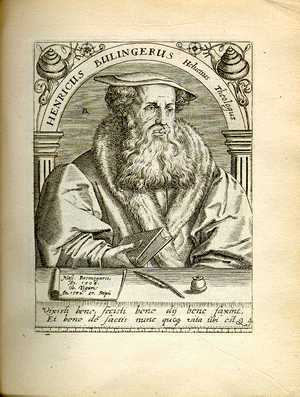3. Heinrich Bullinger
On 9th December 1531 the Zurich Council chose Heinrich Bullinger as Zwingli’s successor. Far less is known about him. He belongs to the Reformers who are most underestimated and whose lifework, precisely in regard to its theological comprehension, has only been incompletely appraised up to this point.
Bullinger was born on 4th July 1504 in Bremgarten (today’s Kanton
Aargau). At the age of twelve he went to the seminary in Emmerich/Niederrhein
influenced by the Devotio moderna (see lesson
1). From 1519 Bullinger studied in Cologne and completed his Master’s
degree in 1522. In his study time in Cologne, Bullinger’s turn
towards the Reformation took place, above all on the basis of the texts
of Luther and Melanchthon. From 1523 Bullinger was a teacher in the Cistercian
monastery in Cappel, where alongside the usual instruction he held public
lectures in which he worked exegetically and systematically from an independently
Reformed perspective. From 1523 he enjoyed a friendship with Zwingli.
Bullinger was able to take over individual thoughts of Zwingli and also
develop them. Zwingli, however, used Bullinger’s knowledge as well.
From 1529 to 1531 Bullinger was preacher in Bremgarten, before he then
became “Antistes” (chief pastor) of the Zurich Church. He
exercised this office up to the end of his life.
 His
main activity in Zurich was the consolidation of the Reformation. He
gained the trust of the Zurich councils, and he succeeded for more than
40 years to hold in balance the political demand of the Gospel on the
one hand and the fact that the authority of his office existed in the
Word alone on the other. He stood in a network of various Swiss and international
relations (among others things, through a rich correspondence involving
more than 12 000 letters), cared for social and church reforms and in
addition was very productive as a writer of theology and history. His
most important work includes a theological “Sum of the Christian
Religion” as well as the “Confessio Helvetica posterior” (the
second Helvetic Confession) of 1562. Also to be emphasised is his collaboration
in the “Consensus Tigurinus” (Zurich Consensus) of 1549,
in which an agreement between Geneva and Zurich, and so a united Reformed
doctrine of the Lord’s Supper, was developed. Theologically, Bullinger’s
first priority was not to be original, but rather to pass on what he
had perceived. With regards to content, the concept of covenant stands
in the middle of his theology. Admittedly he had taken this over from
Zwingli, but he then nevertheless developed it considerably. He was to
have a significance in the further course of Reformed theology that is
not to be underestimated (on the understanding of covenant in Reformed
theology cf. the planned lesson 15 of this basic course). On 27th September
1575, Bullinger died.
His
main activity in Zurich was the consolidation of the Reformation. He
gained the trust of the Zurich councils, and he succeeded for more than
40 years to hold in balance the political demand of the Gospel on the
one hand and the fact that the authority of his office existed in the
Word alone on the other. He stood in a network of various Swiss and international
relations (among others things, through a rich correspondence involving
more than 12 000 letters), cared for social and church reforms and in
addition was very productive as a writer of theology and history. His
most important work includes a theological “Sum of the Christian
Religion” as well as the “Confessio Helvetica posterior” (the
second Helvetic Confession) of 1562. Also to be emphasised is his collaboration
in the “Consensus Tigurinus” (Zurich Consensus) of 1549,
in which an agreement between Geneva and Zurich, and so a united Reformed
doctrine of the Lord’s Supper, was developed. Theologically, Bullinger’s
first priority was not to be original, but rather to pass on what he
had perceived. With regards to content, the concept of covenant stands
in the middle of his theology. Admittedly he had taken this over from
Zwingli, but he then nevertheless developed it considerably. He was to
have a significance in the further course of Reformed theology that is
not to be underestimated (on the understanding of covenant in Reformed
theology cf. the planned lesson 15 of this basic course). On 27th September
1575, Bullinger died.